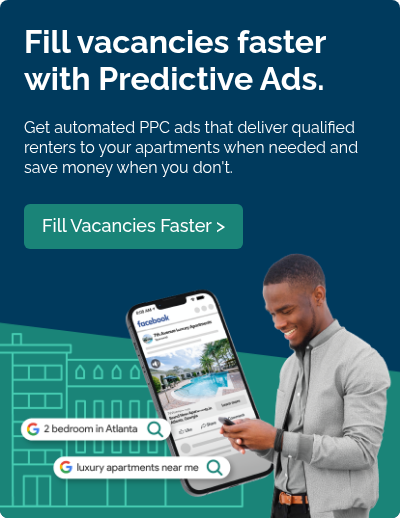Google Ads
While organic search largely depends on having an established website with a good track record, utilizing Google Ads is slightly different. With Google Ads, you can purchase traffic to your community website. Paying for ads makes it easier to start showing up in the search results relatively quickly so that you can continue earning leads through rebranding.
It would be best if you were careful with Ads, however. Without a targeted strategy, you could waste a lot of money on Google Ads and see very little return on that investment.
A classic example is paying for ads on broad search terms like 'apartments for rent (city, state).' When someone types that query into Google, it will cost a lot of money for your community's ads to be featured in the search engine results. Worse, it'll be less likely any traffic to your website generated from that ad will be qualified.
The best place to begin with Google Ads is with defensive ads. Defensive ads display when someone searches for your community by name.
Defensive ads do a couple of things for you. First, they guarantee top placement when someone searches for you by name. Second—and this is huge—people who search for you by name will be your best leads, and you can get your apartments in front of them by targeting keywords related to them. If you can attract your best leads, you'll be in a perfect position from a leasing perspective.
Meta (Facebook) Advertising
Meta's ads platform is an excellent secondary resource for an apartment community that needs more paid traffic generated to its website. While targeting a specific audience within Meta is more challenging, you can still create advertising campaigns targeting people who fit your general resident profile. As it's also a highly visible social media platform, it can ease some of the burdens when you rebrand your apartments because more people can become familiar with the new identity.
Google Business Profile
Finally, you need to set up (or edit) your Google Business Profile listing. Updating your community's brand in Google can be tricky because you likely have a business listing for your community's old name or brand.
Citation consistency, or having the same business name, address, and phone number across all online references to your business, is essential.
There are many different online business directories, and getting the same information to all of them is complex and, truthfully, a danger of the rebranding process. You must ensure that your Google Business Profile is accurate and up-to-date. If your citations are inconsistent, Google will look at your business listing and say, "I can't trust this," and won't show it to users.
The minimal requirement is to change your business name on your Google Business Profile page, which will require you to re-verify your business ownership. The new name you've submitted to Google must be the same as it is on your website and other official documentation. Even omitting an article like "the" may cause Google to have less trust in the accuracy and reliability of your listing. Google will also send a postcard to the address you've listed, and you'll be required to enter the PIN on the postcard to confirm the address is correct.
In addition to having consistent name, address, and phone number information, you'll also want a link to your community website, community photos, and (ideally) user reviews on your business listing. These are ways of building trust with Google, and user reviews excepted are easy to set up.
Tip: If you have an ad and your Google Business Profile on the same search engine results page, you will attract a much larger share of clicks than if you are missing one of those results. More importantly, it increases the rate of your new, renamed website's organic listing moving up the ranks.
Conclusion
It would be best if you had a marketing strategy that continues generating traffic to your community's website while going through a name change. The last thing you want is for your leasing office phone to be completely silent in the months after a rebrand because no one can find you online. Thankfully, Google Ads, Meta, and Google Business Profile can help you maintain your apartments' online visibility during a rebrand.


